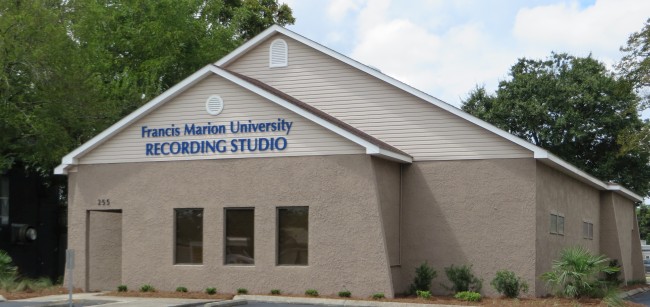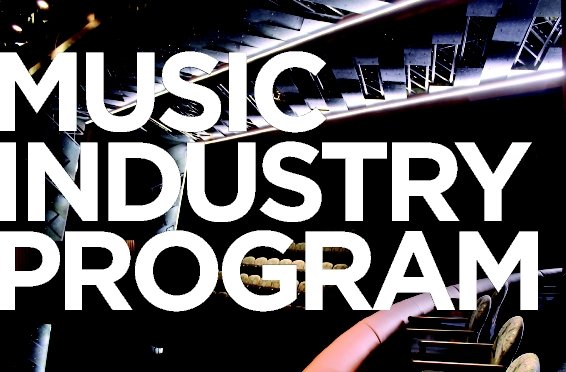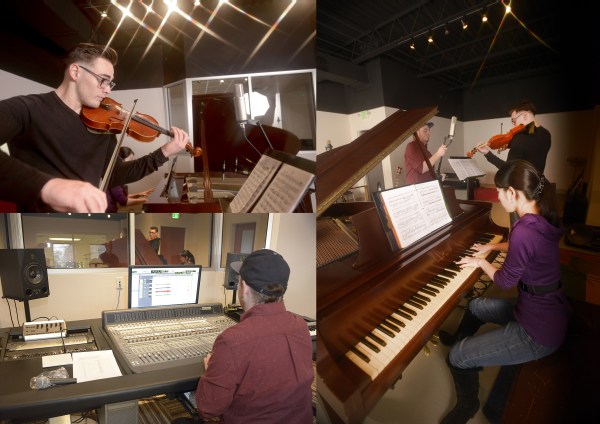 MISSION STATEMENT
MISSION STATEMENT
ARCHIVED CONTENT - REDIRECT
|

THE MUSIC PROGRAM
THE MUSIC INDUSTRY MAJOR: PROGRAM HANDBOOK (Under Revision)
The
Music Industry major provides training for students seeking an
alternative to traditional performance and/or education paths in music.
After taking foundation courses in applied music (vocal or
instrumental), music theory, history, business and technology, students
tailor their courses for their goals by concentrating in one of three
specialty areas:
1] Performance track
2] Business track (marketing, promotion, venue management, etc.)
3] Technology track (recording, production, sound reinforcement, etc.)
Career opportunities within the music business arena might
include: music publicity, marketing, and artist management;
music publishing, merchandising, and physical or online
retail/distribution; recording and media development;
entertainment law; venue management. The program also allows
the student to expanding their personal tools to succeed in
a career as a performer, composer, and/or educator.
 MISSION STATEMENT
MISSION STATEMENT
The
mission of the Francis Marion University Music Industry Program is to
educate, train and develop students to excel in music as a career.
This is done with a solid education in music and an expansive education
in the liberal arts. Our curriculum embraces both time honored
and contemporary musical styles. Through a course of scholarly and
practical learning experiences integrating performance, writing and
technology each student is prepared for career opportunities open to
today’s music professional. The Music Industry Program serves as
the musical center for the university and surrounding community.
CURRICULUM*
A
well-rounded education that prepares students to succeed in the modern
world is at the heart of the traditional liberal arts education.
Graduation requirements for this degree are 48 semester hours of
General Education requirements, 56 semester hours of Music Industry
courses, and 18 semester hours of an approved minor.
This is a rigorous program with high expectation for participating
students; the emphasis is on “music.” Students in all concentrations
will have experience in the fundamentals of the performance, business
and technology tracks of study.
* Specific requirements are subject to approval by university faculty.
PREPARATION FOR THE PROGRAM
It
is expected that students entering this degree program will have
prerequisite vocal and/or instrumental skills. The student should be as
capable vocally or instrumentally as a student beginning a music
performance major.
While the ability to read music and formal training in music are not
required to enter the program, students who have participated in a
structured high school music program or have several years of study
with a private teacher are in a much better position to succeed than
students who have had no prior formal training. Basic music reading
skills (pitch recognition in treble and bass clef and understanding of
reading rhythms in quarter, eighth, and sixteenth notes) and basic
music theory knowledge (key signatures, major scales, chord structure)
are of enormous benefit to students starting the program.
The curriculum is not for persons specifically seeking an audio
engineering degree, or seeking a music business designation of any
kind. The Bachelor of Science degree in Music Industry develops a
well-rounded understanding of the music and music industry arts.
| Music
Performance Courses Music Theory Aural Skills Music History Applied Lessons Ensembles Conducting |
|
Music Industry
Courses Music Commerce Intro to Technology Sound Recording/Reinforcement Internship |
MUSIC INDUSTRY PROGRAM ADMISSION
REQUIREMENTS
Students admitted to Francis Marion
University may register as Music Industry majors. There are
currently no additional Music program acceptance qualifying
standards students must meet to enroll in the Music Industry
program.
However, it is helpful for potential students to recognize
that this is a rigorous program with high expectation for
participating students; the emphasis is on “music.” For
example, students are required to study
traditional music theory and select a performance specialty
(instrument or voice). Applied lessons in the performance
specialty stress a conventional approach to performance
focusing on scales, etudes, and classic literature.
If students feel they may need help because they are lacking
the background described above, they can take steps to
“catch up.” For example, there are some free online courses
and tutorials offered on the Internet. Also they can get
assistance through basic keyboard lessons offered by private
instructional studios or music stores.
 THE HYMAN
FINE ARTS CENTER FACILITIES
THE HYMAN
FINE ARTS CENTER FACILITIES
Designed by the Boston architectural firm of Perry, Dean, Stahl and Rogers and constructed in 1980, the Fine Arts Center is a Post-Modern building housing educational and performance spaces for the music program.
The John W. Baker Art and Music Wing of the Hyman Fine Arts Center, which includes faculty offices for the department, also houses practice rooms and studios for individual vocal and instrumental instruction. The south wing of the Fine Arts Center includes the 350 seat University Theatre and the Adele Kassab Recital Hall, an intimate 150 seat performance space with infinitely variable acoustics
FMU PERFORMING ARTS CENTER